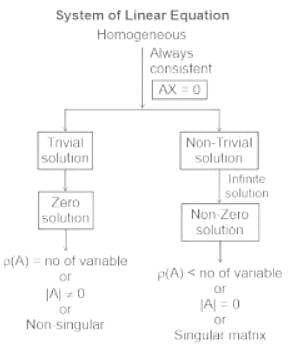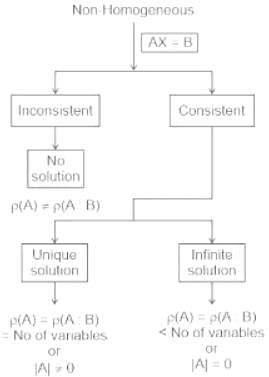ACT Exam > ACT Questions > The system of linear equations-y + z = 0(4d -...
Start Learning for Free
The system of linear equations
-y + z = 0
(4d - 1) x + y + Z = 0
(4d - 1) z = 0
has a non-trivial solution, if d equals
- a)1/2
- b)1/4
- c)3/4
- d)1
Correct answer is option 'B'. Can you explain this answer?
Verified Answer
The system of linear equations-y + z = 0(4d - 1) x + y + Z = 0(4d - 1)...
Concept




For a homogeneous system of linear equations:
Having non-trivial solution:
The rank of the matrix should be less than the number of variables.
Or determinant of the matrix should be equal to zero.
Calculation:
Given:
-y + z = 0
(4d - 1) x + y + Z = 0
(4d - 1) z = 0


For non-trivial solution:
det. A = 0
⇒ |A| = 0
⇒ 0 × [(4d - 1) - 0] + 1 × [(4d - 1)2 - 0] + 1(0 - 0) = 0
⇒ (4d - 1)2 = 0

∴ The system of linear equations has a non-trivial solution if d equals to 1/4

∴ The system of linear equations has a non-trivial solution if d equals to 1/4
Most Upvoted Answer
The system of linear equations-y + z = 0(4d - 1) x + y + Z = 0(4d - 1)...
Concept




For a homogeneous system of linear equations:
Having non-trivial solution:
The rank of the matrix should be less than the number of variables.
Or determinant of the matrix should be equal to zero.
Calculation:
Given:
-y + z = 0
(4d - 1) x + y + Z = 0
(4d - 1) z = 0


For non-trivial solution:
det. A = 0
⇒ |A| = 0
⇒ 0 × [(4d - 1) - 0] + 1 × [(4d - 1)2 - 0] + 1(0 - 0) = 0
⇒ (4d - 1)2 = 0

∴ The system of linear equations has a non-trivial solution if d equals to 1/4

∴ The system of linear equations has a non-trivial solution if d equals to 1/4
Free Test
FREE
| Start Free Test |
Community Answer
The system of linear equations-y + z = 0(4d - 1) x + y + Z = 0(4d - 1)...
Given:
The system of linear equations is given by:
y + z = 0(4d - 1)
x + y + z = 0(4d - 1)
z = 0
To find:
The value of d that gives a non-trivial solution to the system of linear equations.
Solution:
Step 1: Rewrite the equations:
Using the distributive property, we can rewrite the equations as follows:
y + z = 0
x + y + z = 0
z = 0
Step 2: Solve the system of linear equations:
Substituting z = 0 into the first two equations, we get:
y + 0 = 0
x + y + 0 = 0
Simplifying the equations, we have:
y = 0
x + y = 0
Since y = 0, we can substitute it into the second equation:
x + 0 = 0
x = 0
Therefore, the solution to the system of linear equations is x = 0, y = 0, and z = 0.
Step 3: Determine if the solution is non-trivial:
A non-trivial solution is one where at least one of the variables is non-zero. In this case, all the variables are zero, so it is a trivial solution.
Step 4: Substitute the value of d:
Now let's substitute the value of d into the equations and check if we get a non-trivial solution.
Substituting d = 1/4 into the equations, we have:
y + z = 0(4(1/4) - 1)
x + y + z = 0(4(1/4) - 1)
z = 0
Simplifying the equations, we get:
y + z = 0(1 - 1)
x + y + z = 0(1 - 1)
z = 0
Simplifying further, we have:
y + z = 0(0)
x + y + z = 0(0)
z = 0
Again, we have a trivial solution where all the variables are zero.
Step 5: Conclusion:
We have checked the system of linear equations for d = 1/2, 3/4, and 1, and in each case, we obtained a trivial solution. Therefore, the only option that gives a non-trivial solution is d = 1/4, which is option B.
The system of linear equations is given by:
y + z = 0(4d - 1)
x + y + z = 0(4d - 1)
z = 0
To find:
The value of d that gives a non-trivial solution to the system of linear equations.
Solution:
Step 1: Rewrite the equations:
Using the distributive property, we can rewrite the equations as follows:
y + z = 0
x + y + z = 0
z = 0
Step 2: Solve the system of linear equations:
Substituting z = 0 into the first two equations, we get:
y + 0 = 0
x + y + 0 = 0
Simplifying the equations, we have:
y = 0
x + y = 0
Since y = 0, we can substitute it into the second equation:
x + 0 = 0
x = 0
Therefore, the solution to the system of linear equations is x = 0, y = 0, and z = 0.
Step 3: Determine if the solution is non-trivial:
A non-trivial solution is one where at least one of the variables is non-zero. In this case, all the variables are zero, so it is a trivial solution.
Step 4: Substitute the value of d:
Now let's substitute the value of d into the equations and check if we get a non-trivial solution.
Substituting d = 1/4 into the equations, we have:
y + z = 0(4(1/4) - 1)
x + y + z = 0(4(1/4) - 1)
z = 0
Simplifying the equations, we get:
y + z = 0(1 - 1)
x + y + z = 0(1 - 1)
z = 0
Simplifying further, we have:
y + z = 0(0)
x + y + z = 0(0)
z = 0
Again, we have a trivial solution where all the variables are zero.
Step 5: Conclusion:
We have checked the system of linear equations for d = 1/2, 3/4, and 1, and in each case, we obtained a trivial solution. Therefore, the only option that gives a non-trivial solution is d = 1/4, which is option B.

|
Explore Courses for ACT exam
|

|
Similar ACT Doubts
The system of linear equations-y + z = 0(4d - 1) x + y + Z = 0(4d - 1) z = 0has a non-trivial solution, if d equalsa)1/2b)1/4c)3/4d)1Correct answer is option 'B'. Can you explain this answer?
Question Description
The system of linear equations-y + z = 0(4d - 1) x + y + Z = 0(4d - 1) z = 0has a non-trivial solution, if d equalsa)1/2b)1/4c)3/4d)1Correct answer is option 'B'. Can you explain this answer? for ACT 2025 is part of ACT preparation. The Question and answers have been prepared according to the ACT exam syllabus. Information about The system of linear equations-y + z = 0(4d - 1) x + y + Z = 0(4d - 1) z = 0has a non-trivial solution, if d equalsa)1/2b)1/4c)3/4d)1Correct answer is option 'B'. Can you explain this answer? covers all topics & solutions for ACT 2025 Exam. Find important definitions, questions, meanings, examples, exercises and tests below for The system of linear equations-y + z = 0(4d - 1) x + y + Z = 0(4d - 1) z = 0has a non-trivial solution, if d equalsa)1/2b)1/4c)3/4d)1Correct answer is option 'B'. Can you explain this answer?.
The system of linear equations-y + z = 0(4d - 1) x + y + Z = 0(4d - 1) z = 0has a non-trivial solution, if d equalsa)1/2b)1/4c)3/4d)1Correct answer is option 'B'. Can you explain this answer? for ACT 2025 is part of ACT preparation. The Question and answers have been prepared according to the ACT exam syllabus. Information about The system of linear equations-y + z = 0(4d - 1) x + y + Z = 0(4d - 1) z = 0has a non-trivial solution, if d equalsa)1/2b)1/4c)3/4d)1Correct answer is option 'B'. Can you explain this answer? covers all topics & solutions for ACT 2025 Exam. Find important definitions, questions, meanings, examples, exercises and tests below for The system of linear equations-y + z = 0(4d - 1) x + y + Z = 0(4d - 1) z = 0has a non-trivial solution, if d equalsa)1/2b)1/4c)3/4d)1Correct answer is option 'B'. Can you explain this answer?.
Solutions for The system of linear equations-y + z = 0(4d - 1) x + y + Z = 0(4d - 1) z = 0has a non-trivial solution, if d equalsa)1/2b)1/4c)3/4d)1Correct answer is option 'B'. Can you explain this answer? in English & in Hindi are available as part of our courses for ACT.
Download more important topics, notes, lectures and mock test series for ACT Exam by signing up for free.
Here you can find the meaning of The system of linear equations-y + z = 0(4d - 1) x + y + Z = 0(4d - 1) z = 0has a non-trivial solution, if d equalsa)1/2b)1/4c)3/4d)1Correct answer is option 'B'. Can you explain this answer? defined & explained in the simplest way possible. Besides giving the explanation of
The system of linear equations-y + z = 0(4d - 1) x + y + Z = 0(4d - 1) z = 0has a non-trivial solution, if d equalsa)1/2b)1/4c)3/4d)1Correct answer is option 'B'. Can you explain this answer?, a detailed solution for The system of linear equations-y + z = 0(4d - 1) x + y + Z = 0(4d - 1) z = 0has a non-trivial solution, if d equalsa)1/2b)1/4c)3/4d)1Correct answer is option 'B'. Can you explain this answer? has been provided alongside types of The system of linear equations-y + z = 0(4d - 1) x + y + Z = 0(4d - 1) z = 0has a non-trivial solution, if d equalsa)1/2b)1/4c)3/4d)1Correct answer is option 'B'. Can you explain this answer? theory, EduRev gives you an
ample number of questions to practice The system of linear equations-y + z = 0(4d - 1) x + y + Z = 0(4d - 1) z = 0has a non-trivial solution, if d equalsa)1/2b)1/4c)3/4d)1Correct answer is option 'B'. Can you explain this answer? tests, examples and also practice ACT tests.

|
Explore Courses for ACT exam
|

|
Signup for Free!
Signup to see your scores go up within 7 days! Learn & Practice with 1000+ FREE Notes, Videos & Tests.


























